The Man Who Halted the Growth of Tumors: Dr. Harold F. Dvorak
ASG Winners: Then & Now
The Szent-Györgyi Prize was established in honor of Nobel laureate Dr. Albert Szent-Györgyi, co-founder of NFCR, to recognize outstanding scientific achievement in the war against cancer. Ten years later, “ASG Winners: Then & Now” looks at these winners, their extraordinary contributions and how their discoveries have made possible new approaches to treating cancer.
Dr. Harold F. Dvorak
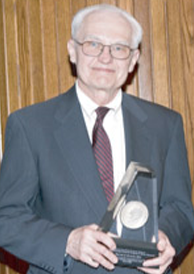
Dr. Harold F. Dvorak at the ASG Ceremony in 2006
The first winner of the Szent-Györgyi Prize was Harold F. Dvorak, MD, distinguished Mallinkrodt Professor of Pathology Emeritus at Harvard Medical School and former chief of the Department of Pathology at Beth Israel Deaconess Medical Center. In 1983, Dr. Dvorak was the first to demonstrate that tumor cells secrete a vascular endothelial growth factor (VEGF), known at the time as vascular permeability factor or VPF. Dr. Dvorak’s seminal discovery provided the molecular basis for the field of angiogenesis and helped pave the way for researchers to develop anti-angiogenesis treatments to halt and even reverse tumor growth. Today, anti-cancer therapies that work by inhibiting angiogenesis are among the most promising new approaches to treating cancer.
What is Angiogenesis?
Like all living tissues, tumors need a steady supply of blood to survive. Blood vessel formation, or “angiogenesis,” makes it possible for tumors to grow and spread. If cancer researchers knew the mechanisms by which tumors acquire additional blood vessels, they might discover new strategies to block this process and literally starve tumors to keep them from growing.
Dr. Dvorak’s Discovery of VEGF
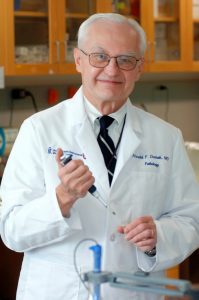
Dr. Harold F. Dvorak in the laboratory
While conducting research supported by NFCR, Dr. Dvorak discovered that cancerous tumors make and secrete VEGF. This was how tumors acquire and form new blood vessels. VEGF is the way tumors grow and spread. Tumors differ from healing wounds: As soon a wound is healed, VEGF production is turned off abruptly. Tumors, on the other hand, continue to make large amounts of VEGF. This, in essence, keeps the VEGF Production in an “on position” so that cancer cells grow and spread. This explained how malignant tumors differed from those of normal tissue in both structure and function. “Hal Dvorak’s contributions to the field of cancer research are legendary,” says NFCR President, Sujuan Ba, PhD. Dr. Dvorak’s groundbreaking discovery has changed the face of cancer research and led to the development of VEGF-targeting anti-angiogenic drugs such as bevacizumab or Avastin®. In 2004, Avastin was approved by the U.S. Food and Drug Administration for the treatment of colorectal cancer.
Today’s Impact
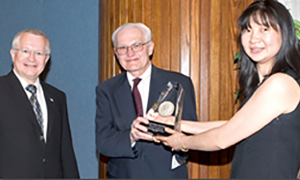
(From left to right) Dr. Daniel Von Hoff, Dr. Harold F. Dvorak and Dr. Sujuan Ba at the ASG Ceremony in 2006
The 2006 ASG Prize Selection Committee Chairman, Daniel Von Hoff, MD, now Director of Translational Research at the Translational Genomics Research Institute (TGen) in Phoenix, Arizona, said, “Without Dr. Dvorak’s fundamental discovery we would probably not have had the therapeutic agent Avastin (bevacizumab), which has had a tremendous impact on improving survival for patients with advanced colorectal cancer, breast cancer, non-small cell lung cancer and renal cell carcinoma. In addition, other small molecules which inhibit VEGF have also shown outstanding clinical antitumor activity with dramatic therapeutic effects for patients worldwide.” Today in the U.S., in addition to colorectal cancer, Avastin is FDA-approved for treatment of non-small cell lung cancer, renal cell carcinoma, the aggressive brain cancer glioblastoma multiforme (GBM) and certain types of cervical and ovarian cancers. More than 280 clinical trials are currently investigating the use of this particular anti-VEGF agent in over 50 tumor types.
Recent Blood Vessel Research
Dr. Dvorak’s recent research projects have led to the identification and characterization of at least six different kinds of blood vessels in tumors. While current anti-angiogenic therapies primarily act against only one of them, his latest discoveries provide opportunities for new types of treatments. His research group has already discovered the new therapeutic targets on the other five vessel types and they are aiming to improve the effectiveness of anti-angiogenic therapy by attacking the entire tumor environment. “Dr. Dvorak’s initial discovery helped to take cancer investigations in a whole new direction,” said Jeffrey S. Flier, MD, the 21st Dean of the Faculty of Medicine at Harvard University, “an endeavor he continues to this day.”
Related Content
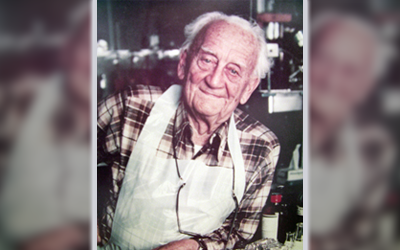 |
Learn more about the Nobel-Prize Winning Co-Founder of NFCR: Albert Szent-Györgyi |
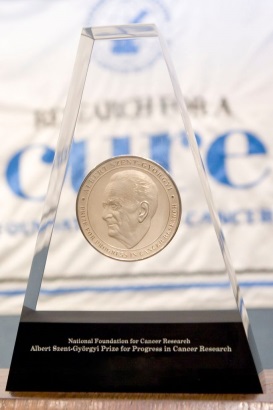 |
|












